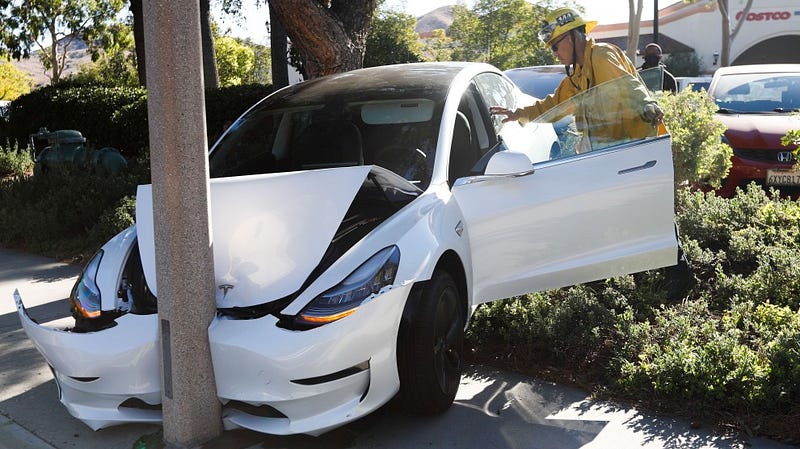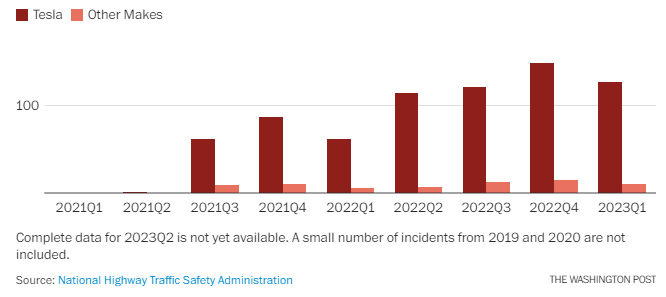Debunking Washington Post Misrepresentation of Tesla FSD Safety
Written on
Chapter 1: Overview of Misleading Reporting
The recent coverage by The Washington Post regarding Tesla's Full Self-Driving (FSD) accidents has raised eyebrows due to its questionable statistical interpretations. This esteemed publication, once held in high regard, has claimed that Tesla's driver assistance systems, namely Autopilot and FSD beta, are purportedly 10 times more dangerous than their competitors. This assertion is both misleading and fundamentally incorrect.

When Autopilot is activated, users receive prompts to remain attentive within seconds. However, this does not prevent some drivers from dozing off. Autopilot functions similarly to an aircraft autopilot, maintaining a steady course in clear lanes. Yet, like any limited system, it cannot prevent accidents if a driver is incapacitated. The future holds promise, as the transition to FSD could usher in a new era of autonomous driving, significantly reducing accidents.
The Washington Post's criticisms appear to be ideologically driven, potentially stemming from Elon Musk's mixed political viewpoints. Despite his claims of being a left-leaning voter, the publication’s bias seems to cloud its judgment.
Section 1.1: Flawed Statistical Comparisons
The article's comparison of Tesla's FSD accident data is fundamentally flawed, as it fails to account for the number of miles driven per accident. The methodology used resembles that of an elementary school student, lacking the necessary normalization of data.
This paragraph highlights the elementary nature of the error in statistical reporting, emphasizing the need for accurate data representation.
Subsection 1.1.1: The Raw Numbers Dilemma

The raw accident numbers presented do not provide a complete picture. Without knowing the 'denominators'—such as the miles driven by Tesla versus non-Tesla vehicles under driver assistance—this analysis is laughable. The Washington Post’s approach to statistics is not only negligent but also disregards the more comprehensive data Tesla offers in its reports.
In truth, if a significantly higher number of Tesla vehicles are utilizing driver assistance, it is expected that the raw accident counts would be similarly elevated. This comparison lacks intellectual rigor.
Section 1.2: Understanding Driver Assistance
As Tesla's sales soar—reportedly increasing by around 40% year-on-year—so too does the frequency of FSD and Autopilot usage. All drivers, regardless of the brand, are legally responsible when using driver assistance, and are alerted about inattentiveness. In 2022, Tesla vehicles were statistically 8.5 times safer concerning accidents per million miles compared to other vehicles, a figure that does not yet include the enhanced safety of the latest FSD version.
Chapter 2: The Future of Tesla FSD
The video titled "Debating Rebuttals" explores the nuances of argumentation in the context of Tesla's safety claims, providing insights into how statistics can be misrepresented.
Tesla's FSD beta version 11.4.2 is approaching reliability levels comparable to Waymo's, without the need for costly LIDAR or extensive mapping. Within the next 18 to 24 months, it is anticipated that FSD will receive regulatory approval, potentially achieving safety levels 10 to 20 times safer than human drivers.
Moreover, FSD technology could save nearly one million lives annually, reduce injuries dramatically, and enhance mobility for various demographics, all while lowering global freight costs. Some speculate this could elevate global GDP by as much as 50%.
The Washington Post's approach to journalism—marked by partisanship and a lack of thorough research—does a disservice to its readers. The legacy of truth-seeking journalism, exemplified by figures like Bob Woodward and Carl Bernstein, is being tarnished.
Section 2.1: Elon Musk's Impact
Despite polarizing opinions, Musk's influence on tech and society is largely positive. His decisions regarding Twitter, while controversial, have sparked significant discussions on trust and transparency in digital platforms.
Twitter is fundamentally a platform for opinions, and the responsibility for fact-checking should lie with its users rather than the media. The overreaction from The Washington Post towards Musk and Tesla seems to reflect a deeper ideological bias rather than an objective analysis of the facts.
In conclusion, it is essential to seek balanced and fair reporting. Misrepresentation, especially when it comes to safety data, can have far-reaching consequences. The narrative surrounding Tesla's FSD merits a more nuanced understanding, far removed from politically motivated critiques.
The second video, "Rebuttal Basics in Debate," delves into the critical examination of arguments, relevant in the context of Tesla's safety discussions.